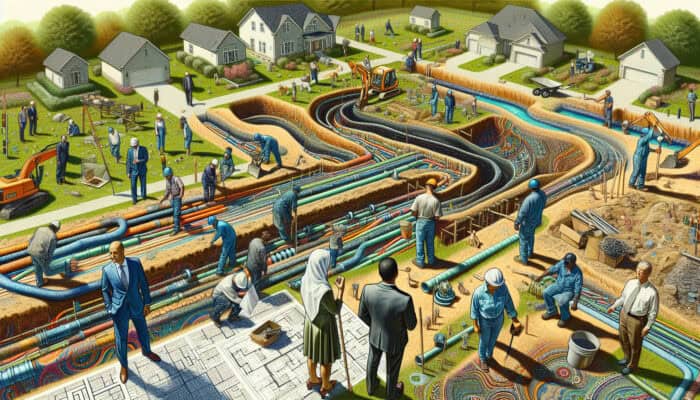Your Ultimate Guide to Effective Landscape Drainage Solutions
What is Landscape Drainage and Why is it Crucial for Safeguarding Your Property?

When discussing landscape drainage in the picturesque West End of Vancouver, we refer to the essential management of excess water to protect properties from the adverse effects of flooding and erosion. This management involves various systems, including French drains, surface grading, and swales, meticulously designed to redirect water away from vulnerable areas. The primary goal is to maintain the integrity and functionality of landscapes, thereby preventing common drainage issues that homeowners typically encounter, such as:
- Water pooling in yards.
- Basement flooding.
- Soil erosion.
- Inadequate water flow away from foundations.
- Driveway washouts.
- Mould and mildew growth resulting from excessive moisture.
- Plant and lawn health deterioration.
For homeowners, grasping the nuances of landscape drainage is crucial, especially in regions like the West End of Vancouver, where frequent and heavy rainfall can present considerable challenges for property management. Understanding these systems not only aids in safeguarding your investment but also enhances the overall aesthetic and functionality of your outdoor spaces.
Why is Proper Drainage Vital for Preserving the Integrity of Your Property?
The importance of adequate drainage cannot be underestimated. Primarily, it acts as a critical defence against soil erosion, which threatens not only the visual appeal of landscapes but also the structural stability of buildings. Failure to address water flow issues can undermine foundations, leading to costly repairs over time. Furthermore, a well-designed drainage system plays a pivotal role in maintaining the health of your landscape by ensuring that plants receive the appropriate amount of water without the risk of over-saturation. This balance is essential for both residential and commercial properties, as it helps sustain aesthetic allure and protects property value.
Moreover, a properly structured drainage system reduces health risks associated with stagnant water, which can encourage insect infestations and mould growth. By investing in high-quality drainage solutions, homeowners can create a safer living environment while simultaneously enhancing the value and appearance of their properties, ensuring that both beauty and functionality are preserved.
What Benefits Can You Anticipate from Professional Drainage System Installation?
Opting for professional installation of drainage systems brings a multitude of advantages. Skilled professionals ensure that drainage solutions are carefully tailored and executed to meet the unique conditions of each property. This includes essential factors such as soil type, topography, and existing infrastructure. Such a customised approach significantly boosts the efficiency and longevity of drainage systems, leading to optimal performance.
Furthermore, hiring professionals for your drainage system installation can result in long-term financial savings for homeowners. By proactively addressing potential drainage issues, the likelihood of incurring expensive repairs related to water damage is greatly diminished. Many professionals also offer warranties on their work, giving homeowners peace of mind that their system will operate effectively for years to come.
Thorough Examination of Landscape Drainage Services in West End, Vancouver

What Unique Challenges Does the West End Present for Drainage Solutions?
The West End of Vancouver is distinguished by its densely populated urban environment and unique geographical features, including its close proximity to the coast and surrounding hills. These attributes create specific challenges concerning landscape drainage. The region’s abundant rainfall necessitates drainage solutions capable of effectively managing sudden and intense downpours, particularly during the rainy season, when the risk of flooding escalates.
Local experts have successfully implemented various strategies, such as French drains and permeable paving, across diverse properties to tackle these drainage challenges. A notable case involved a residential project where French drains were installed to divert water away from a basement that frequently experienced flooding. This intervention not only protected the home but also enhanced the overall landscape, resulting in healthier garden beds that thrived without the threat of waterlogging.
How Can You Determine the Most Suitable Drainage System for Your Property?
Selecting the appropriate drainage system for your property is a crucial decision that hinges on several factors, including soil type, topography, and prevailing water flow patterns. In the West End, where clay soils are common, it may be necessary to implement systems that enhance drainage, such as French drains or dry wells, to prevent water accumulation.
For properties with significant slopes, surface grading can effectively redirect water away from the foundation, reducing the risk of flooding. Homeowners should also consider any existing structures or landscaping features that could influence drainage patterns. Consulting with a local drainage professional can provide tailored recommendations, ensuring that the selected system effectively addresses the specific drainage challenges commonly encountered in the area, thereby safeguarding your property.
What Are the Key Steps Involved in the Installation Process of Drainage Systems?

The installation of landscape drainage systems encompasses several crucial steps. Initially, a comprehensive site assessment is conducted to evaluate existing conditions and pinpoint problem areas that require immediate attention. Following this assessment, a drainage system is designed, taking into account the unique characteristics of the property and identifying the most effective solutions to mitigate these challenges.
Once the design is approved, the implementation phase begins, which may involve excavation for trenching, installation of drainage materials, and ensuring precise grading to promote effective water flow. Homeowners are encouraged to remain engaged throughout the process, asking questions and providing input to ensure that the final system aligns with their expectations and requirements. By understanding each step of the installation, homeowners can effectively prepare their property for a seamless process that meets their drainage needs.
Identifying Common Drainage Issues in West End, Vancouver
What Factors Contribute to Poor Drainage Conditions?
Poor drainage in the West End can stem from numerous factors, including heavy rainfall, soil compaction, and inadequate grading. In urban settings where impervious surfaces such as asphalt and concrete dominate, water often struggles to flow naturally, leading to pooling and flooding. Additionally, soil compaction can occur due to foot traffic or heavy machinery, further diminishing the ground's ability to absorb water effectively.
Improper grading can exacerbate drainage problems, as it might cause water to flow towards, rather than away from, structures, increasing the likelihood of water-related complications. Identifying these causes is essential for effectively addressing drainage concerns and implementing suitable solutions tailored to the specific conditions of West End properties, thereby ensuring a more resilient landscape.
What Symptoms Should You Be Vigilant About Indicating Drainage Issues?
Early identification of drainage problems can avert significant property damage and costly repairs. Common signs that suggest drainage issues include:
- Water pooling in various areas of the yard.
- Consistently soggy ground.
- Basement or crawl space flooding.
- Cracks in foundation walls.
- Mould or mildew growth inside or around the property.
- Unusual plant growth patterns, with some areas thriving while others decline.
- Water stains on walls or floors.
Being vigilant for these symptoms allows homeowners to swiftly address drainage concerns, preventing them from escalating into costly repairs and ensuring the continued integrity of their properties.
What Solutions Are Available to Effectively Address Specific Drainage Problems?
Effectively tackling drainage issues necessitates customised solutions tailored to the specific problem at hand. For instance, if water pooling occurs due to poor grading, simple adjustments to the landscape's slope may suffice to resolve the issue. In more complex situations, such as chronic basement flooding, a comprehensive drainage system may be required to effectively manage excess water.
In cases involving severely compacted soils, aeration techniques can significantly enhance water absorption, allowing for better drainage. Additionally, the installation of catch basins or perforated pipes can improve water management in areas prone to excess moisture. Tailoring solutions to fit the unique challenges of each property ensures effective drainage and long-term viability, ultimately protecting homeowners' investments.
How Does Inadequate Drainage Impact Property Value?
The repercussions of insufficient drainage extend beyond mere inconvenience; they can profoundly influence property value. Properties that exhibit unresolved drainage issues often face depreciation due to the risk of water damage, structural complications, and the potential for expensive repairs. Homebuyers are increasingly aware of the importance of reliable drainage systems and may hesitate to invest in properties showing signs of water-related difficulties.
Conversely, proactively addressing drainage concerns can enhance property value by demonstrating responsible maintenance and care. Well-managed drainage systems contribute not only to the structural integrity of homes but also to their overall aesthetic appeal, making them more attractive to prospective buyers and ensuring a higher return on investment.
Essential Maintenance Practices to Ensure Your Drainage System Functions Effectively
What Regular Maintenance Tasks Should You Incorporate into Your Routine?
Regular maintenance of your drainage system is crucial to ensure its longevity and effectiveness. Key maintenance tasks that should be routinely performed include:
- Cleaning gutters and downspouts to prevent clogs and ensure proper water flow.
- Inspecting drainage systems for signs of wear or blockage that could impair functionality.
- Ensuring proper water flow around the property to prevent pooling.
- Checking for sediment buildup in drainage areas, which can obstruct water flow.
- Monitoring plant health, as overly moist areas may indicate drainage issues that require attention.
- Trimming vegetation surrounding drainage systems to prevent obstruction and ensure clear pathways for water.
- Evaluating the condition of drainage materials periodically to identify any necessary repairs or replacements.
By incorporating these maintenance tasks into a regular schedule, homeowners can prevent major drainage concerns from arising and extend the lifespan of their systems, ultimately safeguarding their properties from potential water damage.
When Should You Seek Professional Assistance for Your Drainage System?
Homeowners should consider contacting a professional drainage service when they observe persistent pooling of water, unusual odours, or indicators of system failure such as water backup. If there is any uncertainty regarding the maintenance of the drainage system or if problems persist despite efforts, seeking expert intervention becomes paramount.
Professional services provide a comprehensive evaluation and can recommend effective solutions to restore proper drainage, preventing further complications. Recognising when to seek assistance can save both time and resources in the long run, ensuring that your property is protected from the adverse effects of inadequate drainage.
What Financial Considerations Should You Keep in Mind Regarding Drainage System Maintenance?
The expenses associated with maintaining a drainage system can vary significantly based on various factors, including the system's complexity, frequency of service, and its location. Homeowners should be prepared to budget for routine inspections, cleaning, and potential repairs to ensure the system operates effectively.
Typically, routine maintenance costs can range from a few hundred pounds annually to more substantial sums for complex systems that require regular professional support. Understanding these expenses allows homeowners to incorporate them into their overall property management budget, ensuring that drainage systems remain operational and effective while safeguarding their investment.
Evidence-Based Advantages of Landscape Drainage Services in West End, Vancouver
How Can Efficient Drainage Systems Increase Property Value?
Implementing effective drainage systems can significantly enhance property value by preventing water damage and promoting landscape vitality. For example, properties equipped with advanced drainage solutions, such as permeable pavers or green roofs, have witnessed increases in market value due to their reduced risk of flooding and improved overall visual appeal.
Moreover, homeowners in the West End have reported successful property sales after addressing drainage concerns, as potential buyers appreciate well-maintained landscapes that signify lower future maintenance costs. Investing in proper drainage not only secures the property but also serves as a compelling selling point in real estate listings, ultimately enhancing its marketability.
What Environmental Benefits Do Effective Drainage Solutions Provide?
Proper drainage systems offer significant environmental advantages by minimising runoff and preventing soil erosion. When water is managed efficiently, it reduces the risk of pollutants entering local waterways, thereby contributing to a healthier ecosystem. Furthermore, well-designed drainage solutions enhance groundwater recharge by promoting the infiltration of water into the soil rather than allowing it to run off.
In urban areas like the West End, adopting sustainable drainage practices can mitigate flooding while strengthening the resilience of the natural landscape. By supporting local ecology through effective drainage, homeowners make a meaningful contribution to both the environment and their community, fostering a more sustainable living environment for all.
What Do Recent Studies Indicate About Drainage Efficiency?
Research indicates that well-structured drainage systems significantly reduce water-related issues, enhancing both property value and the usability of outdoor spaces. Studies have shown that properties equipped with effective drainage solutions experience fewer instances of flooding and water damage, thereby lowering long-term maintenance costs and safeguarding property investments.
Experts consistently advocate for customised drainage strategies that consider local climate and soil conditions, as these factors are essential for maximising efficiency. Recent research underscores the importance of investing in high-quality drainage solutions, particularly in regions susceptible to heavy rainfall, such as the West End, where effective management of water flow is paramount.
How Can Proper Drainage Enhance Outdoor Living Spaces?
Effective drainage is essential for improving outdoor living spaces. By preventing waterlogging, homeowners can create functional patios, gardens, and recreational areas that remain usable throughout the year. Well-drained landscapes provide an excellent foundation for outdoor furniture, barbecues, and social gatherings, ensuring that these spaces remain inviting and enjoyable for family and friends.
Additionally, proper drainage supports healthy plant growth, enabling landscaping efforts to flourish without the danger of over-saturation. Homeowners can maximise their enjoyment of outdoor spaces while simultaneously increasing property value through thoughtfully designed drainage solutions that promote both functionality and aesthetic appeal.
What Long-Term Financial Benefits Can Result from Investing in Drainage Solutions?
Investing in high-quality drainage solutions offers substantial long-term financial benefits. By implementing effective systems, homeowners can mitigate risks associated with water damage, which can lead to significant financial losses over time. Proper drainage reduces the likelihood of costly repairs related to flooding, foundation issues, and mould remediation.
Furthermore, maintaining a robust drainage system can enhance overall property value, resulting in a better return on investment over the years. For homeowners in the West End, this means that taking a proactive approach to drainage not only protects their property but also represents a sound financial strategy that pays dividends in the long run.
Choosing the Right Landscape Drainage Service Provider
What Essential Qualities Should You Look for in a Drainage Company?
When selecting a drainage service provider, it’s crucial to consider several key characteristics. Look for companies that demonstrate:
- Proven experience and expertise in landscape drainage.
- Relevant certifications and licenses to ensure compliance with industry standards.
- A strong reputation within the local community, indicating reliability.
- Comprehensive service offerings to address various drainage challenges effectively.
- Transparent pricing with detailed estimates to avoid unexpected costs.
- Positive customer testimonials and references that reflect quality of service.
- A commitment to sustainable practices and eco-friendly solutions that benefit the environment.
These qualities are indicative of a trustworthy provider capable of delivering effective drainage solutions tailored to your property’s unique requirements, ensuring that your investment is well protected.
How Can You Assess a Company’s Previous Performance?
Evaluating a drainage company’s past work is critical for making informed decisions. Start by checking references and requesting testimonials from former clients to gauge their satisfaction. Additionally, reviewing before-and-after photos of completed projects can provide valuable insight into the quality and effectiveness of their work.
Understanding the scope of past projects will help determine whether the company has experience with situations similar to yours. This thorough evaluation process ensures that homeowners select a provider with a proven track record of success in landscape drainage, ultimately leading to satisfactory outcomes.
What Important Questions Should You Ask Before Hiring?
Before engaging a drainage service provider, posing the right questions can clarify expectations and ensure a suitable fit for your needs. Inquire about their experience with local drainage issues, the specific methods they employ, and any warranties they offer on their work to guarantee quality.
Moreover, request detailed cost estimates and timelines for project completion to avoid misunderstandings later. Clear communication regarding strategies, materials, and ongoing maintenance can foster a collaborative relationship, ensuring that your drainage needs are effectively met while aligning with your vision.
Emerging Trends in Landscape Drainage Solutions
What Innovations Are Shaping the Future of Drainage Solutions?
The landscape drainage sector is rapidly evolving, with numerous innovations emerging to enhance efficiency and sustainability. Smart drainage systems equipped with sensors can monitor moisture levels and automatically adjust water flow, optimising both performance and resource usage for maximum effectiveness.
Additionally, eco-friendly materials and techniques, such as green roofs and rain gardens, are gaining popularity. These solutions not only manage water effectively but also contribute positively to the environment, making them ideal options for environmentally conscious homeowners. As these trends continue to develop, they will shape the future of drainage solutions, particularly in urban regions like the West End, where efficient water management is increasingly vital.
How Will Climate Change Influence Future Drainage Requirements?
Climate change is projected to significantly impact drainage needs in the West End and beyond. Increased rainfall intensity may exacerbate existing drainage challenges, necessitating more robust and resilient systems to manage larger volumes of water effectively.
Understanding these future challenges is essential for both homeowners and drainage professionals. By anticipating changes and investing in advanced solutions, property owners can better prepare for the evolving landscape of water management, ensuring their properties remain protected against the increasing risks associated with climate change.
What Role Does Technology Play in Modern Drainage Solutions?
Technology is becoming increasingly essential in landscape drainage solutions, particularly in design, monitoring, and maintenance. Advanced software enables system modelling that allows individuals to predict potential issues and formulate effective solutions tailored to their specific needs.
Moreover, smart technologies facilitate real-time monitoring of drainage systems, alerting homeowners to possible failures or blockages before they escalate into costly problems. The integration of technology into drainage solutions enhances overall efficacy and efficiency, greatly benefiting homeowners in the West End by providing peace of mind and ensuring reliable performance.
How Will Urbanisation Affect Future Drainage Needs?
As urbanisation continues to expand in the West End, the demand for innovative drainage solutions grows. The prevalence of impermeable surfaces, such as roads and buildings, can generate higher runoff volumes, intensifying the risk of flooding in urban settings.
To address these challenges, developers and homeowners must explore sustainable drainage practices that effectively manage increased water flow. Implementing strategies such as permeable paving and green infrastructure will be essential in maintaining a balanced urban ecosystem while preventing flooding, ensuring that infrastructure remains functional and resilient.
Frequently Asked Questions About Landscape Drainage
What Are the Common Indicators of Drainage Issues?
Common indicators include water pooling, soggy ground, basement flooding, and mould growth. Recognising these early signs can help prevent significant damage to your property.
How Often Should I Perform Maintenance on My Drainage System?
Regular maintenance is advisable at least once a year, but more frequent checks may be warranted in areas experiencing heavy rainfall or following severe weather events to ensure optimal performance.
What is the Typical Cost of Installing a Drainage System?
The cost of drainage installation can vary significantly based on system complexity and property size, typically ranging from a few thousand to tens of thousands of pounds, depending on the specific requirements.
Can I Install Drainage Systems Myself?
While some homeowners may possess the skills to install basic systems, professional installation is recommended for complex drainage solutions to ensure proper design and effectiveness, thereby safeguarding your investment.
How Can I Prevent Drainage Issues from Occurring?
Regular maintenance, appropriate grading, and investing in effective drainage solutions can significantly help avert drainage issues from developing, ensuring your property remains dry and well-managed.
What Types of Drainage Systems Are Most Suitable for Clay Soil?
French drains and dry wells are often ideal for clay soils, as they assist in redirecting excess water away from problematic areas, ensuring proper drainage.
Do Drainage Systems Require Permits in Vancouver?
Yes, certain drainage installations may necessitate permits. It’s crucial to consult local authorities before proceeding with any drainage project to ensure compliance with regulations.
What Is the Lifespan of a Drainage System?
With proper maintenance, most drainage systems can last over ten years; however, some components may require replacement sooner due to wear and tear, necessitating ongoing evaluation.
What Should I Do If My Drainage System Becomes Clogged?
If you suspect a clog, inspect the system for visible blockages and clear them if it is safe to do so. Otherwise, consult a professional for assistance to prevent further complications.
Are Eco-Friendly Drainage Solutions Available?
Indeed, many eco-friendly drainage solutions, such as rain gardens and permeable pavers, are designed to manage water sustainably while benefiting the environment and enhancing landscape aesthetics.
Connect with us on Facebook!
Presented By: Landscape Drainage in West End Vancouver
The Article: Landscape Drainage Services in West End Vancouver: Your Solution First Published On: https://pacificbluemechanical.ca/
The Article Landscape Drainage Services: Your Solution in West End Vancouver Was Found On https://limitsofstrategy.com
The Article Landscape Drainage Services in West End Vancouver Available Now found first on https://electroquench.com

